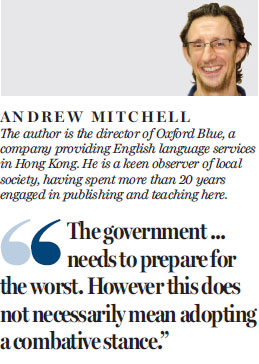The latest LegCo lineup adds new variables to our political landscape
Updated: 2016-09-23 06:18
By Andrew Mitchell(HK Edition)
|
|||||||||
Statistically, the recent Legislative Council election can be said to have changed very little: The pro-establishment camp will still command a majority in the new LegCo, having secured some 45 percent of the popular vote, while the big players on both sides of the political divide remain in the ascendancy - the Democratic Alliance for the Betterment and Progress of Hong Kong (DAB) and the Business and Professionals Alliance for Hong Kong (BPA) among the pro-government parties, and the Democratic Party (DP) and the Civic Party (CP) among the "pan-democrats".
Behind the statistics, however, a lot has actually changed. Gone are many of the old guards of seasoned legislators, for example LegCo President Jasper Tsang Yok-sing, DP Chairwoman Emily Lau Wai-hing and CP leader Alan Leong Kah-kit, all of whom have retired from the council. Gone, too, are Wong Kwok-hing of the Hong Kong Federation of Trade Unions (FTU), Frederick Fung Kin-kee of the Hong Kong Association for Democracy and People's Livelihood (ADPL), and Lee Cheuk-yan of the Labour Party, all of whom failed in their bid for re-election, along with one of LegCo's most ardent filibusterers, Raymond Wong Yuk-man.

In place of all these familiar faces comes a new generation of lawmakers, including six newcomers with openly localist views. Among them are former "Occupy Central" leader Nathan Law Kwun-chung of Demosisto and Sixtus "Baggio" Leung Chung-hang from the post-"Occupy" group Youngspiration. The latter was supported in his campaign by Edward Leung Tin-kei of Hong Kong Indigenous, whose secessionist stance had disqualified him from running in the election himself.
Law and Leung will be joined in the new council by another young radical, Cheng Chung-tai of Civic Passion, who ran on a platform advocating a de facto referendum on amending the Basic Law, a strategy which alliance partner Horace Chin Wan-kan, the so-called godfather of Hong Kong localism, has since admitted was a ruse for advocating the city's independence.
With such extreme elements lining up to take their seats in the new LegCo, the question on everyone's lips now is how things will play out when the new council convenes next month. Will the young radicals wreak havoc, or will there be a move away from the costly and disruptive tactics of Wong Yuk-man and his ilk?
Against this backdrop of uncertainty, it is heartening that Chief Executive Leung Chun-ying was quick to extend an olive branch to the new lawmakers. "The new council is a new start," he stressed on the day following the polls, "as well as a new chance to build cooperation between the executive authorities and the legislature."
Unfortunately there is little sign that the olive branch will be accepted anytime soon. The CE's invitation to meet up with the young lawmakers-in-waiting was brushed aside unceremoniously, while both Nathan Law and Baggio Leung have already stated publicly that they would filibuster in the new chamber, with Leung even going so far as to say that he would usurp the president's seat if necessary.
The stage seems to be set, then, for yet more theatrics in LegCo, unless pressure can be brought to bear on the young radicals by the more moderate elements in the opposition camp. This seems highly unlikely, however, given the localists' seemingly contemptuous attitude toward mainstream "democrats", and the latter's inability in the past to control the behavior of serial filibusterers like "Long Hair" Leung Kwok-hung and People Power's Raymond Chan Chi-chuen, both of whom were re-elected into the new LegCo.
The government, therefore, needs to prepare for the worst. However this does not necessarily mean adopting a combative stance. Indeed by simply pursuing practical policies the CE may well find that he ends up opening up a rift between moderate "pan-democrats', who are more prepared to work with the government in the greater public interest, and extreme localists, who are determined to obstruct government initiatives regardless of consequences.
Alternatively it may be that the young radicals finally see reason. For, as the CE himself noted, localist candidates received a large proportion of their votes from traditional "pro-democracy" supporters who were dissatisfied with the performance of the "pan-democrats" in LegCo. Therefore adopting the more obstructive tactics of the opposition camp would, arguably, be tantamount to political suicide.
Whichever way things pan out, however, one thing seems certain: Interesting times lie ahead in LegCo.
(HK Edition 09/23/2016 page10)